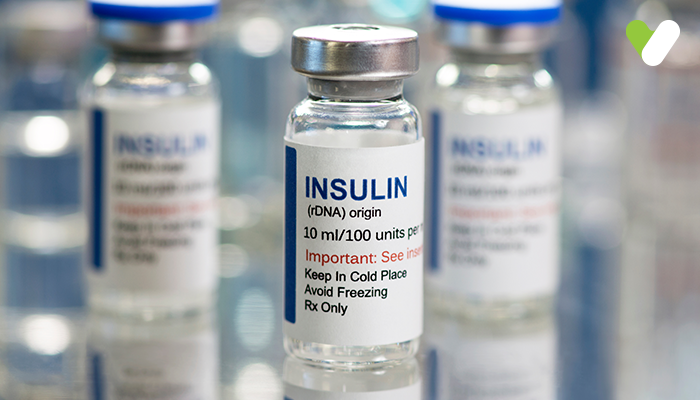Mrs. Shalini (45-years-old) works as a teacher in a private school in Patna. Over the past few months, Shalini was diagnosed with type-2 diabetes. Though she is taking medications her condition is not improving very much. She discussed her problems with her colleague, who advised her to improve insulin sensitivity to control her diabetes.
What is insulin sensitivity and how can you increase insulin sensitivity? Here, we are going to discuss how you improve insulin sensitivity naturally so that people like Shalini can lead a healthy and diabetes-free life.
Insulin is a prerequisite hormone that controls your blood sugar levels. Insulin is produced by the pancreas and removes sugar from your blood into your cells for storage. If you have insulin resistance, your blood cells can’t use insulin efficiently, which will eventually elevate blood sugar levels. This condition may lead to type-2 diabetes and prolonged blood sugar will damage your nerves and other organs.
Insulin sensitivity indicates how responsive your cells are to insulin. By improving it, you are not only reducing insulin resistance but also your diabetes will get better.
Here are some natural ways by which you can increase insulin sensitivity.
1. Get Adequate Sleep
To maintain good health, you need a sound night’s sleep. Sleep depravity is notorious for your health and increases your chances of getting infections, heart disease, and type-2 diabetes. Several studies have claimed that poor sleep lessens insulin sensitivity. A small study was conducted on nine healthy volunteers and it has been found that just 4 hours of sleep in one-night reduced insulin sensitivity as compared to those who slept for 8 1/2 hours per night.2. Regular Exercise
Regular exercises are beneficial in improving insulin sensitivity. One study has claimed 60 minutes of moderate cycling on a machine increased insulin sensitivity for 48 hours among healthy volunteers. Resistance training is also beneficial in improving insulin sensitivity.Another study was conducted on women with overweight and without diabetes and it has been revealed that when participants performed resistance training over 3 months, their insulin sensitivity increased, irrespective of different factors like weight loss. Both aerobic and resistance training enhance insulin sensitivity. So, you should combine both to get the best results.
3. Reduce Stress
Stress impacts negatively on your body’s ability to regulate blood sugar. Under stress, your body produces stress hormones like cortisol and glucagon.These hormones break down glycogen (a form of stored sugar) into glucose, which enters your bloodstream for your body by using a quick source of energy.
If you have chronic stress, then the levels of your stress hormone are high and these will enhance your blood sugar. Stress hormones also make the body more insulin resistant. This stops nutrients from being stored and makes them easily available in the bloodstream. Several studies have also claimed that high levels of stress hormones lessen insulin sensitivity.
To lessen your stress, you should perform activities like meditation, exercise, and sleep that will increase insulin sensitivity.
4. Loss Weight
If you have excess weight, especially in your belly area, this will reduce insulin sensitivity and increase the risk of type 2 diabetes. Belly fat produces hormones that promote insulin resistance in the muscles and liver.To lose your belly fat, you must reduce your weight which will automatically improve insulin sensitivity. It will also minimize your risk for type 2 diabetes if you have prediabetes.
A study was conducted on prediabetic patients who lost 5–7% of their total weight over 6 months, reducing their risk for type 2 diabetes by 54% for the next 3 years. By changing your lifestyle and diet, you can reduce your weight.
5. Consume More Soluble Fiber
There are two categories of fiber and they are soluble and insoluble. Insoluble fiber often acts as a bulking agent and improves your stool movement through the bowels.On the other hand, soluble fiber has some other benefits, like minimizing cholesterol and lessening appetite. Several studies have established a link between high soluble fiber intake and increased insulin sensitivity.
A study was conducted on 264 women and it was revealed that women who ate more soluble fiber had significantly reduced the levels of insulin resistance. Soluble fiber is also friendly for bacteria in your gut, which have been linked to increased insulin sensitivity. Some food items that contain high soluble fiber are legumes, oatmeal, flaxseeds, and vegetables like Brussels sprouts and fruits like oranges.
6. Add More Fruits and Vegetables
Colorful fruits and vegetables contain plant compounds that have antioxidant properties. Antioxidants eradicate free radicals from your body and give your body protection against harmful diseases. Several studies have claimed that eating a diet rich in plant compounds will improve insulin sensitivity. Try to incorporate one fruit every day into your diet regime.7. Minimize Your Added Sugar Intake
There is a striking difference between added sugars and natural sugars. Vegetables and fruits offer natural sugars along with other nutrients.Added sugars are commonly found in processed foods. During the production of high-fructose corn syrup and table sugar, these two sugars are added.
Several experts believe that your insulin resistance (especially if you have diabetes) will enhance if you consume more fructose corn syrup. The effects of fructose on insulin resistance also hamper people who are not diabetics. Foods that are rich in added sugar are candy, sugar-sweetened beverages, cakes, cookies, and pastries.



